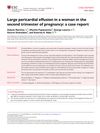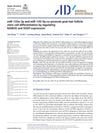 April 2024 in “Frontiers in pharmacology”
April 2024 in “Frontiers in pharmacology” Cynoglossum amabile has medicinal potential but poses safety concerns due to liver toxicity.
 April 2024 in “Dermatology and therapy”
April 2024 in “Dermatology and therapy” There are significant gaps and inconsistencies in diagnosing and treating alopecia areata in Greece and Italy.

Ayurvedic herbs may reduce side effects and improve effectiveness of cancer treatments.
 March 2024 in “Clinical, cosmetic and investigational dermatology”
March 2024 in “Clinical, cosmetic and investigational dermatology” Upadacitinib may effectively treat alopecia areata without side effects.
 February 2024 in “International Journal of Health and Pharmaceutical”
February 2024 in “International Journal of Health and Pharmaceutical” Black rice extract ointment significantly promotes hair growth in Wistar rats.
 February 2024 in “Pharmaceutical research”
February 2024 in “Pharmaceutical research” Hair follicles affect how well small molecules can pass through the skin, and this varies depending on the molecule's features.
 February 2024 in “Bangladesh pharmaceutical journal”
February 2024 in “Bangladesh pharmaceutical journal” The conclusion is that the tested yogurts from Bangladesh are rich in vitamins thiamine and riboflavin, and the testing method is reliable.
 February 2024 in “Sohag Medical Journal”
February 2024 in “Sohag Medical Journal” Various local treatments for alopecia areata show promise, but individualized plans and more research are needed.
 February 2024 in “European heart journal. Case reports”
February 2024 in “European heart journal. Case reports” Early surgical intervention and a multidisciplinary approach are crucial for managing complex cardio-obstetric patients.
 January 2024 in “Dermatology practical & conceptual”
January 2024 in “Dermatology practical & conceptual” Male gender and family history predict alopecia areata recurrence.
 January 2024 in “Biological & clinical sciences research journal”
January 2024 in “Biological & clinical sciences research journal” Apigenin, found in plants and vegetables, has many health benefits, including anti-inflammatory, antioxidant, and anticancer effects.
 January 2024 in “Journal of applied biological chemistry”
January 2024 in “Journal of applied biological chemistry” Glehnia littoralis and Andrographis paniculata extracts can significantly boost hair growth.
 January 2024 in “American journal of clinical dermatology”
January 2024 in “American journal of clinical dermatology” Ritlecitinib is safe and well-tolerated for treating alopecia areata in patients aged 12 and older.
 January 2024 in “Revista de la Asociación Colombiana de Dermatología y Cirugía Dermatológica/Revista de la Asociacion Colombiana de Dermatologia y Cirugia Dermatologica”
January 2024 in “Revista de la Asociación Colombiana de Dermatología y Cirugía Dermatológica/Revista de la Asociacion Colombiana de Dermatologia y Cirugia Dermatologica” Baricitinib successfully treated severe hair loss.
 January 2024 in “International journal of pharmaceutical sciences review and research”
January 2024 in “International journal of pharmaceutical sciences review and research” Indian jujube has many medicinal properties and can help treat ailments like diabetes, inflammation, and cancer.

Henna has many medicinal uses but needs more research to confirm its benefits.

Elastin-like recombinamers show promise for better wound healing and skin regeneration.
 December 2023 in “International Journal of Advanced Research in Science, Communication and Technology”
December 2023 in “International Journal of Advanced Research in Science, Communication and Technology” Semecarpus anacardium Linn. is a plant with many health benefits, including reducing inflammation, fighting cancer, and stimulating hair growth.
 November 2023 in “Frontiers in pharmacology”
November 2023 in “Frontiers in pharmacology” Drug repositioning offers hope for new, affordable treatments for a genetic skin disorder called ARCI.
 November 2023 in “Animal Bioscience”
November 2023 in “Animal Bioscience” miR-133a-3p and miR-145-5p help goat hair follicle stem cells differentiate by controlling NANOG and SOX9.
 October 2023 in “Frontiers in medicine”
October 2023 in “Frontiers in medicine” Comprehensive screening for infections is crucial before starting JAK inhibitors in alopecia areata patients.
 October 2023 in “Frontiers in medicine”
October 2023 in “Frontiers in medicine” Targeted immunotherapy could be a promising new treatment for hair regrowth.
 September 2023 in “Asian journal of beauty & cosmetology”
September 2023 in “Asian journal of beauty & cosmetology” Lipids are important for healthy hair, but their exact role is not fully understood and needs more research.
 September 2023 in “Dermatology and therapy”
September 2023 in “Dermatology and therapy” Ritlecitinib effectively improves hair growth in alopecia areata patients, regardless of hair loss pattern.
 September 2023 in “Journal of pharmacognosy and phytochemistry”
September 2023 in “Journal of pharmacognosy and phytochemistry” Plumbago zeylanica has valuable medicinal properties but needs sustainable cultivation methods.
 July 2023 in “Journal of ayurveda and integrated medical sciences”
July 2023 in “Journal of ayurveda and integrated medical sciences” Ayurvedic treatment can help manage PCOS symptoms.
 July 2023 in “The Egyptian Journal of Hospital Medicine ”
July 2023 in “The Egyptian Journal of Hospital Medicine ” The conclusion is that emotional support and a variety of treatments are important for alopecia areata, but more research is needed.
 July 2023 in “The Egyptian Journal of Hospital Medicine ”
July 2023 in “The Egyptian Journal of Hospital Medicine ” Alopecia areata is a hair loss condition caused by immune factors and can be treated with JAK inhibitors.
 June 2023 in “Dermatology and therapy”
June 2023 in “Dermatology and therapy” The Middle East and Africa need better data, treatment consensus, and support for Alopecia Areata.
 April 2023 in “Tikrit journal of pharmaceutical sciences”
April 2023 in “Tikrit journal of pharmaceutical sciences” Ginger extract helps hair growth and reduces the need for prednisolone in alopecia areata patients.






























